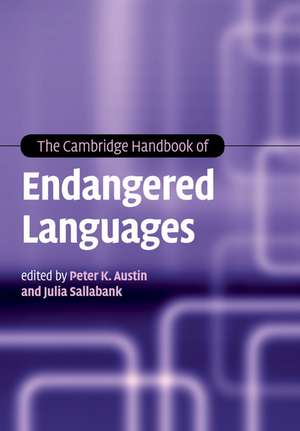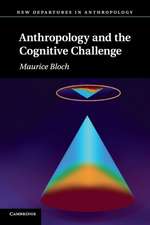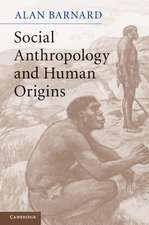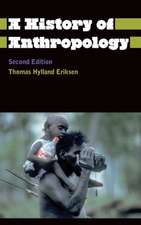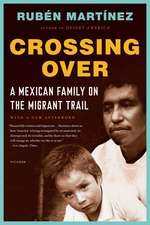The Cambridge Handbook of Endangered Languages: Cambridge Handbooks in Language and Linguistics
Editat de Peter K. Austin, Julia Sallabanken Limba Engleză Paperback – 30 sep 2015
Din seria Cambridge Handbooks in Language and Linguistics
-
 Preț: 257.36 lei
Preț: 257.36 lei -
 Preț: 419.59 lei
Preț: 419.59 lei -
 Preț: 282.02 lei
Preț: 282.02 lei - 14%
 Preț: 989.27 lei
Preț: 989.27 lei - 23%
 Preț: 982.81 lei
Preț: 982.81 lei -
 Preț: 421.83 lei
Preț: 421.83 lei -
 Preț: 284.81 lei
Preț: 284.81 lei -
 Preț: 338.63 lei
Preț: 338.63 lei -
 Preț: 297.50 lei
Preț: 297.50 lei -
 Preț: 280.50 lei
Preț: 280.50 lei -
 Preț: 285.18 lei
Preț: 285.18 lei -
 Preț: 284.94 lei
Preț: 284.94 lei -
 Preț: 281.54 lei
Preț: 281.54 lei -
 Preț: 280.68 lei
Preț: 280.68 lei - 19%
 Preț: 495.90 lei
Preț: 495.90 lei -
 Preț: 417.90 lei
Preț: 417.90 lei - 14%
 Preț: 880.33 lei
Preț: 880.33 lei -
 Preț: 419.23 lei
Preț: 419.23 lei -
 Preț: 315.15 lei
Preț: 315.15 lei - 23%
 Preț: 977.84 lei
Preț: 977.84 lei - 23%
 Preț: 1493.38 lei
Preț: 1493.38 lei -
 Preț: 419.93 lei
Preț: 419.93 lei - 19%
 Preț: 451.06 lei
Preț: 451.06 lei - 23%
 Preț: 949.77 lei
Preț: 949.77 lei - 23%
 Preț: 1066.00 lei
Preț: 1066.00 lei - 14%
 Preț: 989.06 lei
Preț: 989.06 lei -
 Preț: 347.32 lei
Preț: 347.32 lei -
 Preț: 370.92 lei
Preț: 370.92 lei - 23%
 Preț: 1075.01 lei
Preț: 1075.01 lei - 23%
 Preț: 1023.97 lei
Preț: 1023.97 lei - 11%
 Preț: 507.18 lei
Preț: 507.18 lei - 23%
 Preț: 753.13 lei
Preț: 753.13 lei -
 Preț: 473.75 lei
Preț: 473.75 lei -
 Preț: 468.73 lei
Preț: 468.73 lei - 23%
 Preț: 1027.19 lei
Preț: 1027.19 lei -
 Preț: 398.99 lei
Preț: 398.99 lei -
 Preț: 398.39 lei
Preț: 398.39 lei
Preț: 394.36 lei
Nou
Puncte Express: 592
Preț estimativ în valută:
75.47€ • 81.95$ • 63.39£
75.47€ • 81.95$ • 63.39£
Carte tipărită la comandă
Livrare economică 23 aprilie-07 mai
Preluare comenzi: 021 569.72.76
Specificații
ISBN-13: 9781107552449
ISBN-10: 1107552443
Pagini: 580
Ilustrații: 16 b/w illus. 10 tables
Dimensiuni: 170 x 244 x 30 mm
Greutate: 0.91 kg
Editura: Cambridge University Press
Colecția Cambridge University Press
Seria Cambridge Handbooks in Language and Linguistics
Locul publicării:New York, United States
ISBN-10: 1107552443
Pagini: 580
Ilustrații: 16 b/w illus. 10 tables
Dimensiuni: 170 x 244 x 30 mm
Greutate: 0.91 kg
Editura: Cambridge University Press
Colecția Cambridge University Press
Seria Cambridge Handbooks in Language and Linguistics
Locul publicării:New York, United States
Cuprins
1. Introduction Peter K. Austin and Julia Sallabank; Part I. Endangered Languages: 2. Language ecology and endangerment Lenore Grenoble; 3. Speakers and communities Colette Grinevald and Michel Bert; 4. Survey of endangered language situations around the world David Bradley; 5. Language contact and change in endangered languages Carmel O'Shannessy; 6. Structural aspects of language endangerment Naomi Palosaari and Lyle Campbell; 7. Language and culture Lev Michael; 8. Language and society Bernard Spolsky; Part II. Language Documentation: 9. Language documentation Tony Woodbury; 10. Speakers and language documentation Lise Dobrin and Josh Berson; 11. Data and language documentation Jeff Good; 12. Archiving and language documentation Lisa Conathan; 13. Digital archiving David Nathan; Part III. Responses: 14. Language policy for endangered languages Julia Sallabank; 15. Revitalisation of endangered languages Leanne Hinton; 16. Orthography development Friederike Lüpke; 17. Lexicography in endangered language communities Ulrike Mosel; 18. Language curriculum design and evaluation for endangered languages Serafin Coronel-Molina and Teresa McCarty; 19. The role of information technology in supporting minority and endangered languages Gary Holton; Part IV. Challenges: 20. Endangered languages and economic development Wayne Harbert; 21. Researcher training and capacity development in language documentation Anthony Jukes; 22. New roles for endangered languages Máiréad Moriarty; 23. Planning a language documentation project Claire Bowern.
Recenzii
'This handbook is an excellent assemblage of facts and ideas about the fast declining world's linguistic diversity. It is uniquely resourceful and comprehensive.' Herman M. Batibo, Former President, World Congress of African Linguistics
'This splendid handbook is an authoritative resource for those seeking to respond responsibly to ongoing loss of the world's languages.' Nancy H. Hornberger, University of Pennsylvania
'The Cambridge Handbook of Endangered Languages is without a doubt a welcome contribution to the field of linguistics and language preservation. One of the key aspects of preserving minority languages is public engagement, so the production of easy to read and highly accessible texts such as this is an important step in the process. It is authoritative and comprehensive, providing both facts and current academic theory to great and provocative effect.' Zoe Bartliff, LinguistList (www.linguistlist.org)
'This splendid handbook is an authoritative resource for those seeking to respond responsibly to ongoing loss of the world's languages.' Nancy H. Hornberger, University of Pennsylvania
'The Cambridge Handbook of Endangered Languages is without a doubt a welcome contribution to the field of linguistics and language preservation. One of the key aspects of preserving minority languages is public engagement, so the production of easy to read and highly accessible texts such as this is an important step in the process. It is authoritative and comprehensive, providing both facts and current academic theory to great and provocative effect.' Zoe Bartliff, LinguistList (www.linguistlist.org)
Descriere
This Handbook examines the reasons behind the loss of linguistic diversity and what can be done to document and support endangered languages.
